状语从句及练习
语法专题:状语从句(含练习和答案)
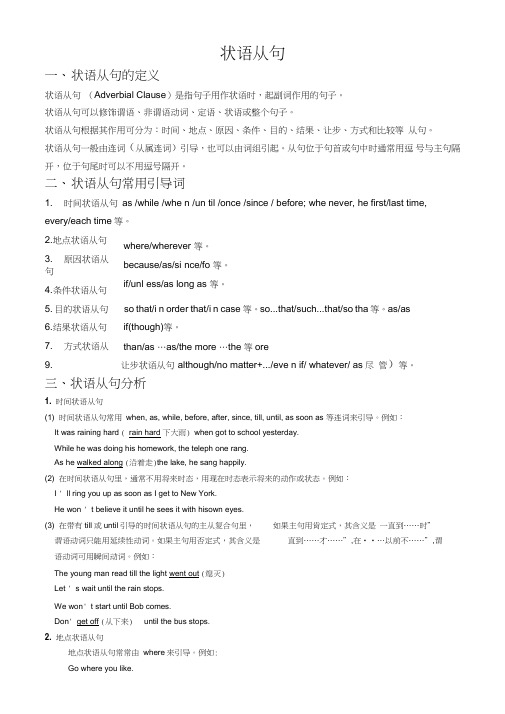
状语从句一、状语从句的定义状语从句(Adverbial Clause)是指句子用作状语时,起副词作用的句子。
状语从句可以修饰谓语、非谓语动词、定语、状语或整个句子。
状语从句根据其作用可分为:时间、地点、原因、条件、目的、结果、让步、方式和比较等从句。
状语从句一般由连词(从属连词)引导,也可以由词组引起。
从句位于句首或句中时通常用逗号与主句隔开,位于句尾时可以不用逗号隔开。
二、状语从句常用引导词1. 时间状语从句as /while /whe n /un til /once /since / before; whe never, he first/last time,every/each time等。
2. 地点状语从句3. 原因状语从句4. 条件状语从句5. 目的状语从句6. 结果状语从句7. 方式状语从句where/wherever 等。
because/as/si nce/fo 等。
if/unl ess/as long as 等。
so that/i n order that/i n case等。
so...that/such...that/so tha等。
as/as if(though)等。
than/as …as/the more …the 等ore9. 让步状语从句although/no matter+.../eve n if/ whatever/ as尽管)等。
三、状语从句分析1. 时间状语从句(1) 时间状语从句常用when, as, while, before, after, since, till, until, as soon as 等连词来引导。
例如:It was raining hard ( rain hard 下大雨) when got to school yesterday.While he was doing his homework, the teleph one rang.As he walked along (沿着走)the lake, he sang happily.(2) 在时间状语从句里,通常不用将来时态,用现在时态表示将来的动作或状态。
初中英语状语从句讲解及练习.doc
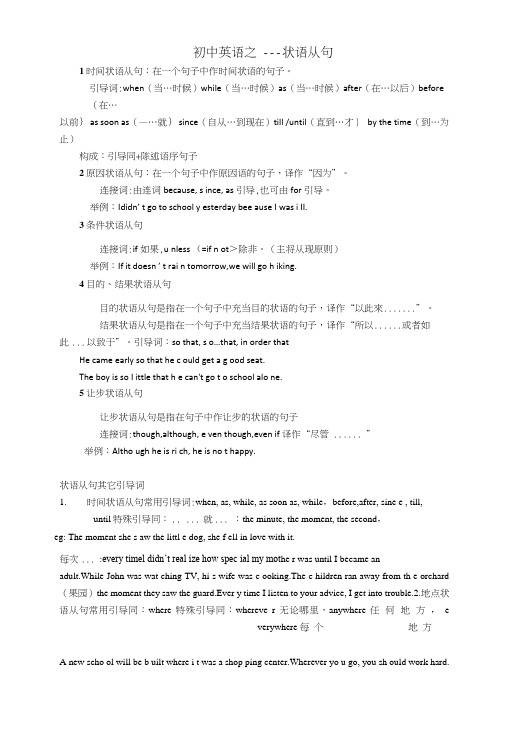
初中英语之 --- 状语从句1时间状语从句:在一个句子中作时间状语的句子。
引导词:when(当…时候)while(当…时候)as(当…时候)after(在…以后)before(在…以前} as soon as(—…就} since(自从…到现在)till /until(直到…才}by the time(到…为止)构成:引导同+陈述语序句子2原因状语从句:在一个句子中作原因语的句子,译作“因为”。
连接词:由连词because, s ince, as引导,也可由for引导。
举例:Ididn’ t go to school y esterday bee ause I was i II.3条件状语从句连接词:if如果,u nless (=if n ot>除非。
(主将从现原则)举例:If it doesn ’ t rai n tomorrow,we will go h iking.4目的、结果状语从句目的状语从句是指在一个句子中充当目的状语的句子,译作“以此來.......”。
结果状语从句是指在一个句子中充当结果状语的句子,译作“所以......或者如此... 以致于”。
引导词:so that, s o…that, in order thatHe came early so that he c ould get a g ood seat.The boy is so I ittle that h e can't go t o school alo ne.5让步状语从句让步状语从句是指在句子中作让步的状语的句子连接词:though,although, e ven though,even if 译作“尽管 ...... ”举例:Altho ugh he is ri ch, he is no t happy.状语从句其它引导词1.时间状语从句常用引导词:when, as, while, as soon as, while,before,after, sine e , till,until 特殊引导同:.. ... 就... :the minute, the moment, the second,eg: The moment she s aw the littl e dog, she f ell in love with it.每次... :every timel didn’t real ize how spec ial my mot he r was until I became anadult.While John was wat ching TV, hi s wife was c ooking.The c hildren ran away from th e orchard (果园)the moment they saw the guard.Ever y time I listen to your advice, I get into trouble.2.地点状语从句常用引导同:where特殊引导同:whereve r无论哪里,anywhere 任何地方,everywhere 每个地方A new scho ol will be b uilt where i t was a shop ping center.Wherever yo u go, you sh ould work hard.状语从句练习单项选择1.John does n't letever ybodyinthe kitchen __________ h e could makehis sur prisedinner fortheparty.A. which B. when C. so that D. as if 2.I wouldt hankit __________ you call back this a fternoon for the doctor5 smeeting.A.until B. if C. when D. that3.Asfar as Iam concerned (就我而言),education is about learning and the more you learn,—____ A. the betterlife will you get B. the betterlife you will ge tC. you will get the bet ter lifeD.will you get the bet ter life4.Af ter the war, a new school wasbuilt _____________ t here had once be en(曾经有)a theatre.A. that B. where C . which D. whe n5.—Is Mr.Smith in the office?—Yes , __________ he is in charg e of the office, he mustbe there.A.since B. how ever C. whether D. for 6.As your good friendJ will do ____________help you.A. that I can to B. what I canto C. all that I can D. what I can7.Someone called me up in the middle ofthe night, b ut they hung up(挂断电话)____________ I coul d answer the phone.A.as B.since C. until D. before8.We must hurry up __________catchup with the last train.A. that B. so that to C. in order that D. in ord er toLondon 9.No m atter ________ h ard it ma y be, I will carry it out .A. what B. whatev er C.how D. however 1 0. _________you may do, you must do itwell.A. Which B.Whenever C. What ever D.WhenM. ________ you are so weak, you’d better sta y at home.A.Since B. For C. B ecause D. Though 1 5.1saw Mr.Smith last S unday. We had not seen each other ____________ I left .A. as B. before C.since D. till 16.1’11 be back before you ________ .A.will leave B will have left C.leave D. would lea vel7.If the weather ____________ tomor row, we will go picnic i n the centra 1 park.A wil 1 be fine Bis fine Cis going to be fine D h ave been fine18. ________________________ They wen t on working it was late at night.A. eve n if B.as if C. however D. as tho ughl9.l hurr ied _____________ I wouldn't b e late for c lass.A. sine e B. sotha t C.as if D . unless20.T he volleybal I match will be put off if it __________ .A. will r ain B. rain s C. r ained D. is raining【实例解析】1.(2004年北京市海淀区中考试题)You will sta y healthy ________ you do more exerci se, such as running and walking.A.ifB. howC. beforeD. where2.(2004年江丙省中考试题)…Shall we go on wor king?Ye s, _________ I prefer to have a rest.A. whenB. ifC. be causeD. th ough3.(2004年徐州市中考试题)N one of us kn ew what had happened ___________ they told us abo ut it.A. w henB. unti IC. afterD. though4.(2004年泉州市中考试题)••-1 ho pe you’ll en joy your tri p, dear!—Thank you,mum. Til gi ve you a cal I ___________ I get there.A. untilB. as soon a sC. sinceD. till【中考演练】一.单项填空1. ______ he z s old, he c an still car ry this heav y bag.A. T houghB. Si neeC. ForD. So2.•■-Do you know if he ______ to play ba sket ball wi th us?---1 think he wi II come if h e _______ fre e tomorrow.A. comes; i sB. comes;will beC.will come;isD. will come; will b e3.In the z oo if a chil d _____ into the water a nd can't swi m, the dolph ins may come up _________ him.A. will fall; to he IpB. fall s; to helpC. will fall; help D . falls; hel ping4.1don z t remember _________ he worked in th at city when he was youn g.A. whatB. which C . where D.who5.We wil I stay at ho me if my aunt __________ to visit us t omorrow.esB. c omeC. will comeD. is coming6.Th e police ask ed the child ren _______ cross the st reet _________ the traffi c lights tur ned green.A. not; befo reB. don't; whenC. n ot to; untilD. not; af ter7.1was late for cla ss yesterday ________ t he re was somet hing wrong w ith my bike.A. when B . that C. u ntil D. bee ause8.I’ll go swimming with you if I _________ f ree tomorrow .A. will b eB. shall beC. am D . was9.In t he exam, the ________ yo u are, _______ the ________ mistakes y ou will make .A. carefu I; littleB. more ca reful; fewes tC. more c areful; fewe rD. more c a ref u I; less10.You shou Id finish yo ur lessons _______ you g o out to pal y.A. beforeB. afterC. whenD.while11.1hurried _____ I wouldn't be late for class.A.sinceB. s o thatC. a s ifD. uni ess12.When you read the book, you'd better make a mark ________ you have any questio ns.A. whi chB. thatC. where D . though13.The teacher raised his v oice ________ a ll the stu dents could hear him.A. forB. s o thatC. b ecauseD. i n order14.H e took off h is coat ________ h e felt hot.A. be causeB. asC. ifD.since15.It is ______ th at we'd like to go out f or a walk.A. a lovely dayB. t oo lovely a dayC. so lovely a dayD. such Io vely a day16 . Mary had _______ m uch w ork to do th at she staye d at her off ice all day.A. suchB.soC. tooD. very17.______ I fel t very tired , I tried to finish the work.A. AlthoughB.BecauseC.AsD. As if18.______ t he day went on, the weat her got wors e.A. WithB. SinceC. WhileD.As19.______ well you c an drive, yo u must drive carefully.A. So long asB.ln order tha tC. No ma tter how D . The momentBeijing20. Write to me as soon as you _________ to.A . will get B. get C. g etting D. g ot二.根据中文意思完成下列英语句子1.不管他跟我开什麽玩笑,我都不生气。
状语从句讲解及练习
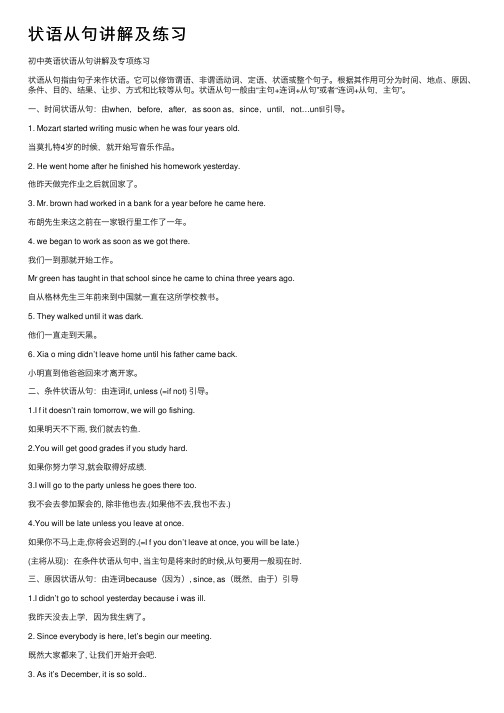
状语从句讲解及练习初中英语状语从句讲解及专项练习状语从句指由句⼦来作状语。
它可以修饰谓语、⾮谓语动词、定语、状语或整个句⼦。
根据其作⽤可分为时间、地点、原因、条件、⽬的、结果、让步、⽅式和⽐较等从句。
状语从句⼀般由“主句+连词+从句”或者“连词+从句,主句”。
⼀、时间状语从句:由when,before,after,as soon as,since,until,not…until引导。
1. Mozart started writing music when he was four years old.当莫扎特4岁的时候,就开始写⾳乐作品。
2. He went home after he finished his homework yesterday.他昨天做完作业之后就回家了。
3. Mr. brown had worked in a bank for a year before he came here.布朗先⽣来这之前在⼀家银⾏⾥⼯作了⼀年。
4. we began to work as soon as we got there.我们⼀到那就开始⼯作。
Mr green has taught in that school since he came to china three years ago.⾃从格林先⽣三年前来到中国就⼀直在这所学校教书。
5. They walked until it was dark.他们⼀直⾛到天⿊。
6. Xia o ming didn’t leave home until his father came back.⼩明直到他爸爸回来才离开家。
⼆、条件状语从句:由连词if, unless (=if not) 引导。
1.I f it doesn’t rain tomorrow, we will go fishing.如果明天不下⾬, 我们就去钓鱼.2.You will get good grades if you study hard.如果你努⼒学习,就会取得好成绩.3.I will go to the party unless he goes there too.我不会去参加聚会的, 除⾮他也去.(如果他不去,我也不去.)4.You will be late unless you leave at once.如果你不马上⾛,你将会迟到的.(=I f you don’t leave at once, you will be late.)(主将从现):在条件状语从句中, 当主句是将来时的时候,从句要⽤⼀般现在时.三、原因状语从句:由连词because(因为), since, as(既然,由于)引导1.I didn’t go to school yesterday because i was ill.我昨天没去上学,因为我⽣病了。
状语从句专项练习50题

状语从句专项练习50题1. I was doing my homework ______ my mother was cooking dinner.A. whileB. whenC. asD. until答案:A。
本题考查时间状语从句连接词的用法。
“while”强调两个动作同时进行,“我在做作业”和“我妈妈在做晚饭”两个动作同时发生,所以用“while”。
“when”既可表示同时,也可表示先后,在此语境不如“while”贴切。
“as”表示“随着”,不符合句意。
“until”表示“直到”,与句意不符。
2. ______ I was walking in the park, I saw a beautiful bird.A. WhileB. WhenC. As soon asD. Before答案:B。
“when”在此表示一个动作正在进行时,另一个动作突然发生,“我正在公园散步时,看到了一只漂亮的鸟”。
“while”强调两个动作同时持续进行,不太符合。
“as soon as”表示“一……就……”,逻辑不符。
“before”表示“在……之前”,不符合语境。
3. He didn't come home ______ it was dark.A. untilB. whileC. whenD. as答案:A。
“not...until...”是固定搭配,表示“直到……才……”,“他直到天黑才回家”。
“while”“when”“as”都没有这种“直到”的意思。
4. ______ she was reading the book, she fell asleep.A. WhileB. WhenC. AsD. Since答案:A。
“while”强调在“她读书”这个动作进行的过程中“睡着了”。
“when”更多表示动作的先后发生。
“as”有“随着”的意思,不太符合。
“since”表示“自从”,不符合句意。
5. I'll call you ______ I arrive in Beijing.A. whileB. whenC. as soon asD. until答案:C。
状语从句讲解与练习
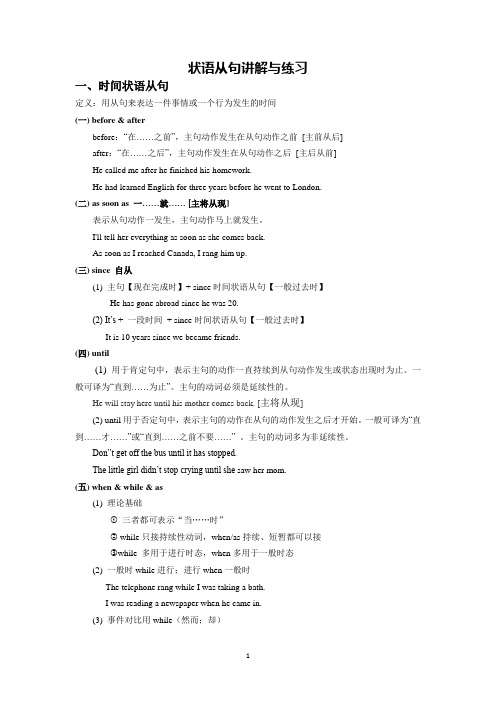
状语从句讲解与练习一、时间状语从句定义:用从句来表达一件事情或一个行为发生的时间(一) before & afterbefore:“在……之前”,主句动作发生在从句动作之前[主前从后]after:“在……之后”,主句动作发生在从句动作之后[主后从前]He called me after he finished his homework.He had learned English for three years before he went to London.(二)as soon as 一……就…… [主将从现]表示从句动作一发生,主句动作马上就发生。
I'll tell her everything as soon as she comes back.As soon as I reached Canada, I rang him up.(三) since 自从(1) 主句【现在完成时】+ since时间状语从句【一般过去时】He has gone abroad since he was 20.(2) It’s + 一段时间+ since时间状语从句【一般过去时】It is 10 years since we became friends.(四) until(1) 用于肯定句中,表示主句的动作一直持续到从句动作发生或状态出现时为止。
一般可译为“直到……为止”。
主句的动词必须是延续性的。
He will stay here until his mother comes back. [主将从现](2) until用于否定句中,表示主句的动作在从句的动作发生之后才开始。
一般可译为“直到……才……”或“直到……之前不要……” 。
主句的动词多为非延续性。
Don”t get off the bus until it has stopped.The little girl didn’t stop crying until she saw her mom.(五) when & while & as(1) 理论基础①三者都可表示“当……时”② while只接持续性动词,when/as持续、短暂都可以接③while 多用于进行时态,when多用于一般时态(2) 一般时while进行;进行when一般时The telephone rang while I was taking a bath.I was reading a newspaper when he came in.(3) 事件对比用while(然而;却)Father was preparing a report while I was playing PC games.He likes coffee while she likes tea.(4) “随着”/“一边…一边”用asThings are getting better and better as time goes on.She sang as she went along.二、原因状语从句because 因为(不与so连用)(1) because &because ofbecause引导原因状语从句because of 是介词短语,后跟n./pron./V-ing,句中作原因状语-- Why didn't he come here?-- He didn’t come here because he was ill.-- He didn’t come here because of his illness.(2) because & for & since & asbecause 语气最强烈;for放句中,用来表示一种附带或补充解释、说明;since & as 通常放句首,作“既然”讲。
(英语)状语从句练习题含答案及解析

(英语)状语从句练习题含答案及解析一、初中英语状语从句1.--Has the meeting begun yet?--Not yet. We have to wait everyone is here.A.and B.until C.or D.but【答案】B【解析】【详解】考查连词用法。
句意:—会议已经开始了吗?—不,还没有。
我们必须等到大家都到齐了。
and和;until直到;or或者、否则,but但是。
根据题干可知我们得等到大家都到了,这里表示直到……时候用until.故选B.2.-Have you improved your spoken English?-Not yet.I'll try my best______I am not good at it now.A.so B.although C.but D.until【答案】B【解析】【详解】句意:——你提高你的英语口语了吗?——还没有.虽然我现在还不擅长,但是我会尽力的.考查连词辨析。
A. so所以;B. although 虽然;C. but但是;D. until直到。
根据语境推测句意是——你提高你的英语口语了吗?——还没有.虽然我现在还不擅长,但是我会尽力的.在这里两个句子之间存在一个相反的让步关系,though/although/even though“虽然;尽管”,引导让步状语从句,故选B.【点睛】本题主要考查连词的用法,连词在句子中主要起联系上下文的作用,他们之间的区别就是表示逻辑关系的不同,所以在解题时先要理解上下文含义,然后根据上下文逻辑关系选择合适的连词.前后句之间是让步关系.3.You will fall behind others ______ you work hard.A.if B.unless C.though D.since【答案】B【解析】试题分析:句意:如果你不努力学习,你会落后别人。
A.because因为;B. If如果;C. Unless如果不; D. Though虽然。
状语及状语从句(语法加练习完整讲解).ppt

4.动词不定式(或不定式短语): He went to see a film .他看电影去了。 My father was surprised to hear the news . 我父亲听到这个消息,感到惊奇。
5.分词(短语): He sat there reading a novel . 他坐在那儿看小说。 The students went away laughing. 学生们笑着走开了。
2023最新整理收集 do something
The Adverbial 状语
ห้องสมุดไป่ตู้ 一、什么是状语
修饰动词、形容词 、副词或整个句子 ,说明 动作或 状态特征的句子成分,叫做 状语。
1. 状语修饰动词 Silently she went away. 她悄悄地走开了。
2. 状语修饰句子 Sadly, he will not be there. 令人伤心的是,他将不会在那里了。
The Adverbial Clauses 状语从句
从状种九
时间状语从句 地点状语从句 原因状语从句 条件状语从句 让步状语从句 结果状语从句 目的状语从句 方式状语从句 比较状语从句
时间状语从句
I will discuss this with you when we meet. 我们见面时再与你讨论这件事。
(2)如果动词前有一个或几个助动词,状语位于第一个 助动词之后。 He has already had his lunch .他已吃过午饭了。
(3)如果动词是 be,状语就放在 be动词之后。 He is always at home. 他总是在家。
3.状语位于句末,这是状语的通常位置。 We get up at six in the morning . 我们早晨六点起床。
【语法专项训练】状语从句翻译专项练习及答案
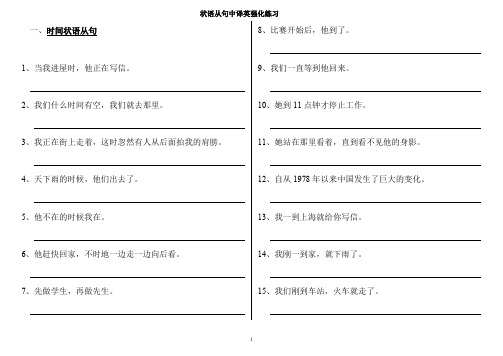
一、时间状语从句1、当我进屋时,他正在写信。
2、我们什么时间有空,我们就去那里。
3、我正在街上走着,这时忽然有人从后面拍我的肩膀。
4、天下雨的时候,他们出去了。
5、他不在的时候我在。
6、他赶快回家,不时地一边走一边向后看。
7、先做学生,再做先生。
8、比赛开始后,他到了。
9、我们一直等到他回来。
10、她到11点钟才停止工作。
11、她站在那里看着,直到看不见他的身影。
12、自从1978年以来中国发生了巨大的变化。
13、我一到上海就给你写信。
14、我刚一到家,就下雨了。
15、我们刚到车站,火车就走了。
16、我们刚开始就被叫停。
17、我每次乘船都晕船。
18、我一听到这首歌,就感到很愉快。
19、下次你来的时候,就会见到他。
二、地点状语从句1、有志者,事竟成。
2、哪里有水,哪里就有生命。
3、你可以随意到你喜欢的任何地方去。
4、无论你去哪都要遵守法律。
三、原因状语从句1、昨天我回来晚了,因为我值班。
2、既然大家都到了,我们开始开会。
3、由于他英语懂得不多,他在字典中查阅这个单词。
4、鉴于天气已经晴朗,我们可以启程了。
5、鉴于他病情严重,我们派人去请医生去了。
四、目的状语从句1、我要把你的电话号码记下来,以免忘记。
2、我把真实情况告诉你,使你能自己作出判断。
3、他们比往常更加努力工作,为了能提前完成工作。
4、多穿点衣服,以免患感冒。
五、结果状语从句1、我们把收音机的音量放大,大家都听到了新闻。
2、他十分激动,以致一句话都说不出来。
3、他说出了这么重要的理由,得到大家的谅解。
4、这是一本十分有意思的书,大家都想看。
六、条件状语从句1、如果我们不怕困难,困难就算不了什么了。
2、除非下雨,我们明天就去那里。
3、只要你努力工作,你就一定能成功。
4、万一我忘了,请提醒我一下。
5、据我所知,那本书下月出版。
七、方式状语从句1、按照我教你的画一只猫。
2、按照人家告诉你做的去做。
3、看上去她好象是生病了。
4、他的行动就好象什么也没有发生。
初中英语状语从句和练习题(含答案)
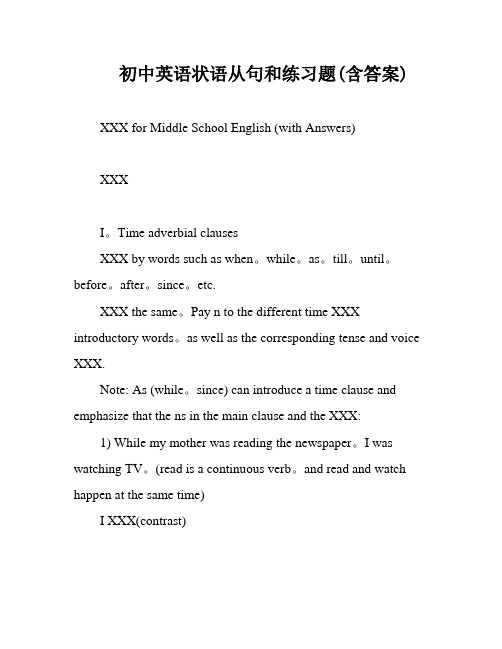
初中英语状语从句和练习题(含答案) XXX for Middle School English (with Answers)XXXI。
Time adverbial clausesXXX by words such as when。
while。
as。
till。
until。
before。
after。
since。
etc.XXX the same。
Pay n to the different time XXX introductory words。
as well as the corresponding tense and voice XXX.Note: As (while。
since) can introduce a time clause and emphasize that the ns in the main clause and the XXX:1) While my mother was reading the newspaper。
I was watching TV。
(read is a continuous verb。
and read and watch happen at the same time)I XXX(contrast)2) When (at the time when)。
the predicate verb of the clause introduced by it can be a XXX。
The n in the clause XXX with the subject's n or after it.I was reading a book when she came into my room。
(come is an instantaneous verb。
and only when can be used。
not while)I often missed my home when (while) I lived in New York。
条件状语从句练习题及答案
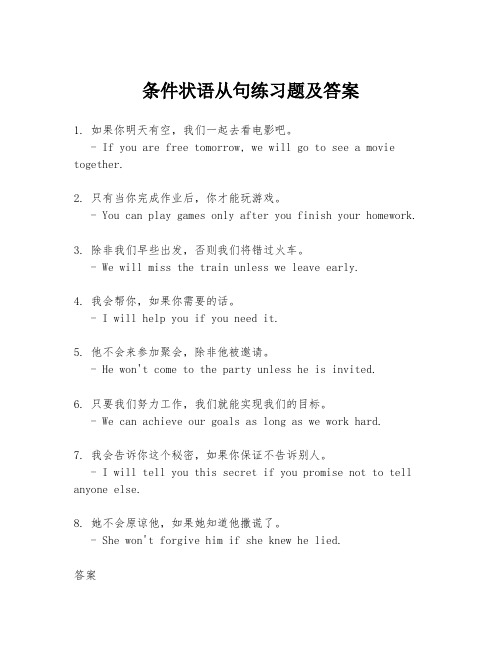
条件状语从句练习题及答案1. 如果你明天有空,我们一起去看电影吧。
- If you are free tomorrow, we will go to see a movie together.2. 只有当你完成作业后,你才能玩游戏。
- You can play games only after you finish your homework.3. 除非我们早些出发,否则我们将错过火车。
- We will miss the train unless we leave early.4. 我会帮你,如果你需要的话。
- I will help you if you need it.5. 他不会来参加聚会,除非他被邀请。
- He won't come to the party unless he is invited.6. 只要我们努力工作,我们就能实现我们的目标。
- We can achieve our goals as long as we work hard.7. 我会告诉你这个秘密,如果你保证不告诉别人。
- I will tell you this secret if you promise not to tell anyone else.8. 她不会原谅他,如果她知道他撒谎了。
- She won't forgive him if she knew he lied.答案1. If you are free tomorrow, we will go to see a movie together.- 正确答案:If you are free tomorrow, we will go to see a movie together.2. You can play games only after you finish your homework.- 正确答案:You can play games only after you finish your homework.3. We will miss the train unless we leave early.- 正确答案:We will miss the train unless we leave early.4. I will help you if you need it.- 正确答案:I will help you if you need it.5. He won't come to the party unless he is invited.- 正确答案:He won't come to the party unless he is invited.6. We can achieve our goals as long as we work hard.- 正确答案:We can achieve our goals as long as we work hard.7. I will tell you this secret if you promise not to tell anyone else.- 正确答案:I will tell you this secret if you promise not to tell anyone else.8. She won't forgive him if she knew he lied.- 正确答案:She won't forgive him if she knew he lied.这些练习题涵盖了不同类型的条件状语从句,包括第一条件(真实条件句)、第二条件(非真实条件句)和第三条件(过去的非真实条件句)。
状语从句解题技巧(超强)及练习题(含答案)含答案解析

状语从句解题技巧(超强)及练习题(含答案)含答案解析一、初中英语状语从句1.How can we improve our environment a lot each of us does something useful for it? A.while B.until C.after D.unless【答案】D【解析】【详解】句意:除非我们每个人都做一些有益的事情,否则我们如何才能大大改善我们的环境呢?考查连词辨析。
while当……的时候,表时间;until直到,表时间;after在……之后,表时间;unless除非,表条件。
本句是条件状语从句,根据句意结构和语境,可知选D。
2.I will go to the English club tomorrow I am too busy.A.since B.if C.unless D.until【答案】C【解析】【详解】句意:明天我将会去英语俱乐部,除非我太忙。
since自从;if如果;unless除非,如果不;until直到…时候。
根据句意可知,这里表示的意思是“如果我不忙,我会…”,故应选C。
3.There are fewer and fewer tigers in India. The situation will continue _______ humans stop hunting them for their fur and bones.A.if B.unless C.because D.since【答案】B【解析】试题分析:句意:印度有越来越少的老虎。
如果人类不停止为了虎皮和虎骨猎杀老虎,情况会继续。
A.if如果,表示条件;B.unless如果不,表示相反的条件;C.because因为,表示原因;D.since自从,表示时间的起点;既然,表示原因。
“如果不”停止,情况会继续。
故选B。
考点:考查连词的用法4.—Dear, I have an important meeting tomorrow.—It doesn’t matter. If you _______ go to the movie tomorrow, I _______ my friend to go with me. A.don’t; will ask B.won’t; will askC.don’t; ask D.won’t; ask【答案】A【解析】试题分析: 句意:亲爱的,明天我有个重要的会议。
状语从句及练习附答案

状语从句(adverbial clause)复习要点:掌握句法功能,记住连接词语法意义:状语从句是复合句中的一种,整个从句作主句的状语,修饰主句中的谓语动词、形容词、或副词。
置于句首时,状语从句后面一般要有逗号隔开;如果状语从句置于句尾,则从句一般不用逗号。
按照所作的状语和意义可分为时间、地点、原因、目的、结果、条件、让步、方式和比较等九种状语从句。
具体如下:一、时间状语从句(Adverbial Clauses of Time)时间状语从句通常由when,whenever,as,while,before,after,assoon as,since,once,no sooner...then,hardly/scarcely...when,tiLl/until 以及the moment,directly,immediately,the second,thefirst time,next time,every time,等引导。
1.由when,as,while 引导的状语从句:1)when 引导时间状语从句,表示当···,其谓语动词可以是延续性的,也可以是非延续性的,其作用最广泛。
When spring comes,trees turn green,When it rains,I usually go to work by taxi.When we were having lunch,the light went out.I will ring you up when I return.When she pressed the button,the lift stopped.He was eating his breakfast when the doorbell rang.be about to do...when...“就在那/这时,(突然)另一个动作发生了,在这儿只能用when。
英语状语从句练习题20篇及解析

英语状语从句练习题20篇及解析一、初中英语状语从句1.I didn’t believe I could do it ____ I got to the top of Mount Tai.A.unless B.until C.after D.as【答案】B【解析】试题分析:句意:直到我到达泰山顶上我才相信我能成功。
A. unless如果不,除非,引导条件状语从句;B. until 直到,引导时间状语从句;C. after 在……后,引导时间状语从句;D. as因为,由于,引导原因状语从句。
not …until直到……才,结合句意,故选B。
考点:考查连词的用法。
2.You'd better get home earlier today we can go out for a big meal.A.in order to B.such that C.so that D.in order【答案】C【解析】句意:你最好今天早点回家,这样我们就可以出去吃大餐了。
A. in order to 为了,后跟动词原形;B. such that没有此用法;C. so that为了,引导目的状语从句;D. in order+that+从句,引导目的状语从句。
we can go out for a big meal表示目的的完整句子,所以使用连词词组so that。
故选:C。
3.— _______ good time we had at the party last night!— Yes. It was _______exciting party that I would never forget it.A.What; so B.How; such C.What a; such an D.How a; so an【答案】C【解析】【详解】试题分析:句意:昨天晚上我们在聚会上玩的是多么开心呀!是的,它是如此的令人兴奋以至于我永远不会忘记它。
状语从句讲解及习题附答案
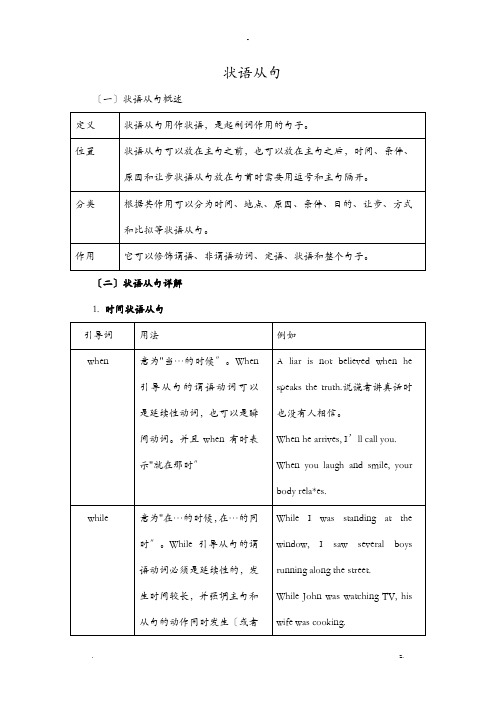
状语从句〔一〕状语从句概述〔二〕状语从句详解1. 时间状语从句2.地点状语从句3.条件状语从句4.原因状语从句5.目的状语从句6.结果状语从句7.让步状语从句8. 比拟状语从句9.方式状语从句练习一一. 单项填空1. _______ he’s old, he can still carry this heavy bag.A. ThoughB. SinceC. ForD. So2. ---Do you know if he _______ to play basketball with us"---I think he will e if he ______ free tomorrow.A. es; isB. es; will beC. will e; isD. will e; will be3. In the zoo if a child _____ into the water and can’t swim, the dolphins may e up ______ him.A. will fall; to helpB. falls; to helpC. will fall; helpD. falls; helping4. I don’t remember ________ he worked in that city when he was young.A. whatB. whichC. whereD. who5. We will stay at home if my aunt ________ to visit us tomorrow.A. esB. eC. will eD. is ing6. The police asked the children _______ cross the street ________ the traffic lights turned green.A. not; beforeB. don’t; whenC. not to; untilD. not; after7. I was late for class yesterday _______ there was something wrong with my bike.A. whenB. thatC. untilD. because8. I’ll go swimming with you if I ________ free tomor row.A. will beB. shall beC. amD. was9. In the e*am, the ________ you are, ______ the _______ mistakes you will make.A. careful; littleB. more careful; fewestC. more careful; fewerD. more careful; less10. You should finish your lessons _______ you go out to play.A. beforeB. afterC. whenD. while11. I hurried _____ I wouldn’t be late for class.A. sinceB. so thatC. as ifD. unless12. When you read the book, you’d better make a mark _______ you have any questions.A. whichB. thatC. whereD. though13. The teacher raised his voice _______ all the students could hear him.A. forB. so thatC. becauseD. in order14. He took off his coat _______ he felt hot.A. becauseB. asC. ifD. since15. It is ______ that we’d like to go out for a walk.A. a lovely dayB. too lovely a dayC. so lovely a dayD. such lovely a day16. Mary had ______ much work to do that she stayed at her office all day.A. suchB. soC. tooD. very17. _______ I felt very tired, I tried to finish the work.A. AlthoughB. BecauseC. AsD. As if18. ______ the day went on, the weather got worse.A. WithB. SinceC. WhileD. As19. ______ well you can drive, you must drive carefully.A. So long asB. In order thatC. No matter howD. The moment20. Write to me as soon as you ________ to Beijing.A. will getB. getC. gettingD. got二. 根据中文意思完成以下英语句子1. 不管他跟我开什么玩笑,我都不生气。
(完整版)状语从句练习

(完整版)状语从句练习状语从句状语从句:指把一句子当着副词作状语时,修饰动词、或整个句子;根据它在句中的作用可分为时间、地点、原因、条件、目的、结果、让步、方式和比较等从句;状语从句前一般由连词(从属连词)引导,也可以由词组引导。
它常位于句首;若位于句中,常用逗号与主句隔开;位于句尾时可以不用逗号隔开。
一、时间状语从句1. 通常由以下连词弓丨导:when / while / as/ after/ before/ as soon as/ since/ till /until / by the time2. 在时间状语从句中,要注意时态一致。
(主将从现)1).when 当…..的时候: Mozart started writing music when he was four years old.2).while 在…期间: He visited a lot of places while he was traveling.3).as 在…的同时;一边…一边...: He smiled as he stood up.4).after 在...之后: He left the classroom after he had finished his homework the other day.5).before 在...之前Mr. brown had worked in a bank for a year before he came here.6).as soon as 一...就... We bega n to work as soon as we got there. I will write to you as soon as i get home.7).since 自...以来(至U现在) Mr green has taught in that school since he came to china three years ago.8)till /until 直至U : They walked till /until it was dark. Tom didn ' t leave home till / until his father came back.难点---- as/ when/ while的辨析as when while都表示主、从句动作同时发生,三者差异如下:as表示一边…一边"/随着,强调两个动作同时进行,I am cooking as I am singing.when 当…..的时候,从句动作可在主句动作"之前"或"之后"发生lit was raining hard when (as) i got there. 还可表and then; at that moment (正在那个时候/突然):I am leaving for Beijing when the phone rang.while 在…期间从句动作为延续性动词或状态词I am cooki ng while I am si ngi ng然而((表转折,对比)she thought I was talking about her daughter, while I was talking about my daughter.Mother was worried because little Alice was ill, especially as (when/ while) father was away.二、条件状语从句要点:状语从句由连词if (如果)、unless (=if not)(除非)弓I导。
状语从句讲解及练习

状语从句状语从句在句中作状语,修饰主句中的动词、形容词或副词等。
状语从句放在主句之前时,常用逗号分开;放在主句之后,一般不用逗号。
状语从句按其意义和作用可分为时间、条件、原因、让步、目的、结果、方式、比较、地点9种。
1.时间状语从句1) 时间状语从句常用连词有when, as, while, before, after, since, till, until, as soon as, hardly … when …, no sooner … than …., the moment等。
2) 时间状语从句一般不用将来时。
因此,主句若为将来时,时间状语从句要用一般现在时。
I’ll go on with the work when I come back tomorrow.3) 连词when, while, as都表示“当……的时候”,但有区别。
as 多用于口语中,强调“同一时间”或“一前一后”,有时还有“随着”的含义。
As he was eating his breakfast, he heard the door bell ring. (强调同一时间)As going out, it began to rain. (强调两个动作紧接着先后发生)As spring warms the good earth, all flowers being to bloom. (as有“随着”的含义)when 强调“特定时间”。
When spring comes, he feels like a trip.When he was eating his breakfast, he heard the door bell ring.while 表示的时间是一段,而不是一点。
while 有时还有对比的含义,意为“然而”。
While he was eating his breakfast, he heard the door bell ring. (强调吃饭的过程)While I was reading, he was playing. (有对比的含义)4) till / until表示“一直到……”时,主句和从句都用肯定式;表示“直到……才……”时,主句用否定式,从句用肯定式。
状语从句练习题及答案
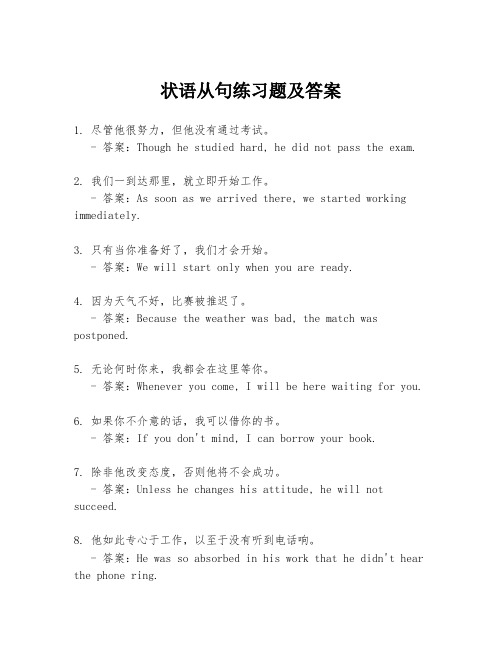
状语从句练习题及答案1. 尽管他很努力,但他没有通过考试。
- 答案:Though he studied hard, he did not pass the exam.2. 我们一到达那里,就立即开始工作。
- 答案:As soon as we arrived there, we started working immediately.3. 只有当你准备好了,我们才会开始。
- 答案:We will start only when you are ready.4. 因为天气不好,比赛被推迟了。
- 答案:Because the weather was bad, the match was postponed.5. 无论何时你来,我都会在这里等你。
- 答案:Whenever you come, I will be here waiting for you.6. 如果你不介意的话,我可以借你的书。
- 答案:If you don't mind, I can borrow your book.7. 除非他改变态度,否则他将不会成功。
- 答案:Unless he changes his attitude, he will not succeed.8. 他如此专心于工作,以至于没有听到电话响。
- 答案:He was so absorbed in his work that he didn't hear the phone ring.9. 她一完成作业,就出去和朋友见面了。
- 答案:She went out to meet her friends as soon as she finished her homework.10. 只要我们团结一致,我们就能克服任何困难。
- 答案:As long as we stand united, we can overcome any difficulty.答案解析- 状语从句通常位于主句之前或之后,有时也可以用逗号与主句隔开。
状语从句练习(含答案和解析)
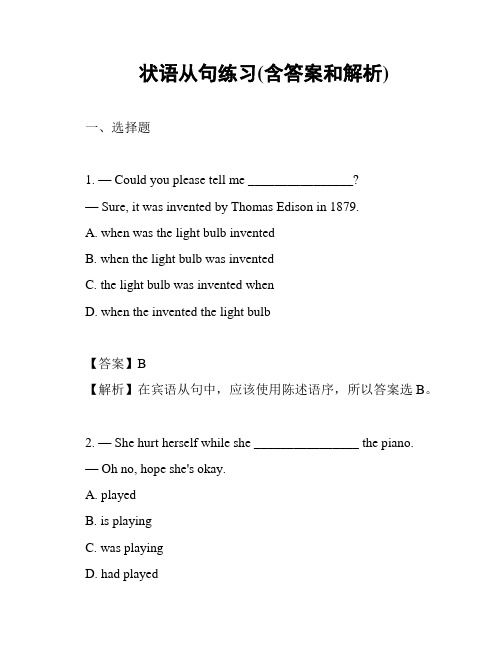
状语从句练习(含答案和解析)一、选择题1. — Could you please tell me ________________?— Sure, it was invented by Thomas Edison in 1879.A. when was the light bulb inventedB. when the light bulb was inventedC. the light bulb was invented whenD. when the invented the light bulb【答案】B【解析】在宾语从句中,应该使用陈述语序,所以答案选B。
2. — She hurt herself while she ________________ the piano. — Oh no, hope she's okay.A. playedB. is playingC. was playingD. had played【答案】C【解析】句子发生的时间是过去,所以应该使用过去进行时,答案选C。
3. The book is not on the table, ________________ I last saw it.A. soB. becauseC. butD. although【答案】A【解析】根据句意,表达的是因果关系,所以应该使用连词so,答案选A。
4. I'll join you for dinner ________________ it doesn't rain.A. whetherB. ifC. soD. because【答案】B【解析】根据句意,表示条件,所以应该使用if,答案选B。
5. — ________________ you study hard, you won't pass the exam.— I know, I'll try my best.A. IfB. UnlessC. WhetherD. Although【答案】B【解析】根据句意,表示否定条件,所以应该使用unless,答案选B。
- 1、下载文档前请自行甄别文档内容的完整性,平台不提供额外的编辑、内容补充、找答案等附加服务。
- 2、"仅部分预览"的文档,不可在线预览部分如存在完整性等问题,可反馈申请退款(可完整预览的文档不适用该条件!)。
- 3、如文档侵犯您的权益,请联系客服反馈,我们会尽快为您处理(人工客服工作时间:9:00-18:30)。
状语从句:用来修饰主句的动词、副词和形容词或整个句子的从句叫状语从句。
(一)时间状语从句:常用when, as, while, before, after, since, till, until, as soon as等连词来引导。
Eg: While he was doing his homework, the telephone rang.他做作业时,电话铃响了。
注意:1.在时间状语从句里,通常不用将来时态,用现在时态表示将来的动作或状态,即“主将从现”。
Eg: (1) I’ll ring you as soon as I get to New York.我一到纽约,就给你打电话。
(2) He won’t believe it until he sees it with his own eyes.直到他亲眼见了,才相信。
2.在带有till或until引导的时间状语从句里;如果主句用肯定式,其含义是“一直到…时”,谓语动词只能用延续性动词;如果主句用否定式,其含义是“直到…才…”,“在…以前不…”,谓语动词可用瞬间动词。
Eg:(1) The young man read till the light went out.这个年轻人一直读到灯熄灭了。
(2) We won’t start until Lily comes.等到丽丽来了,我们才能开始。
(二)地点状语从句:常常用where来引导。
Eg:(1) Go where you like.你想去哪就去哪儿。
(2) Where there is a will, there is a way.有志者事竟成。
(三)条件状语从句1.条件状语从句通常用if和unless引导。
Eg: (1) What shall we do if it snows tomorrow?明天下雪的话,我们该怎么办?(2) Don’t leave the building unless I tell you to.除非我叫你,否则不准离开这座大厦。
2.在条件状语从句里,通常遵循“主将从现”原则。
Eg: I’ll help you with your English if I am free tomorrow.如果明天有空的话,我会来帮你学英语的。
3.“祈使句+ and (or) + 陈述句”在意义上相当于条件状语从句。
Eg:(1) Hurry up, or you’ll be late.= If you don’t hurry up, you’ll be late.赶快,不然你要迟到了。
(2) Study hard and you will pass the exam.= If you study hard, you will pass the exam.努力学习,你就能通过考试。
(四)原因状语从句1.原因状语从句常由because, since和as引导。
Eg: (1) He didn’t come to school because he was ill.因为他生病了,所以没来上课。
(2) As it is raining, we shall not go to the zoo.外面下雨了,我们不能去动物园了。
2.because表示直接原因,语气最强。
because引导的原因状语从句多放在主句之后。
回答由why提出的问题,只能用because。
as和since 语气较弱,一般用来表示明显的原因。
由as和since引导的原因状语从句多放在句首。
Eg: (1) –Why aren’t you going there?---Because I don’t want to.你为什么不去那?因为我不想去。
(2) As he has no car, he can’t get there easily.因为他没有车,他不能轻松地到那里。
(3) Since we have no money, we can’t buy it.因为我们没有钱,我们不能买它。
3.because和so不能同时用在同一个句子里。
(五)结果状语从句1.结果状语从句由so…that…, such…that…, so that等引导。
Eg:(1) He is so poor that he can’t buy a bike for his son.他如此穷以至于他不能为儿子买一辆自行车。
(2) She is such a good teacher that everybody likes her.她是如此好的老师以至于每个人都喜欢她。
2. 在由so…that引导的结果状语从句中,so是副词,与形容词连用。
Eg: He was so glad that he couldn’t say a word.他是如此高兴以至于他一句话也说不出来。
在由such… that…引导的结果状语从句中,such是形容词,它修饰的可以是单数或复数可数名词,也可以是不可数名词;名词前面可以带形容词,也可不带。
如果是单数可数名词,前面需要加不定冠词a或an.Eg: He made such rapid progress that he did well in the exam.他取得了如此快速的进步以至于他在考试中表现的很好。
有时两者可以互换。
Eg: It is such an important match that nobody wants to miss it.= The match is so important that nobody wants to miss it.比赛如此重要以至于没有人想错过。
3.如果名词前有many, much, little, few等词修饰时,只能用so,不用such.Eg: (1)There were so many deer that they ate up all the wild roses.有如此多的鹿以至于他们吃光了所有的野玫瑰。
(2) He has so little time that he can’t go tot the cinema with you.他几乎没有时间了以至于他不能和你去电影院。
(六)目的状语从句1.目的状语从句通常由so that, in order that等引导。
Eg: He studied hard so that he could work better in the future.为了未来可以更好的工作,他努力地学习。
2.so that既可引导目的状语从句,又可引导结果状语从句。
二者的区别为:(1)目的状语从句里往往带有情态动词can, could, may, might等(2)从意义上看,目的状语从句往往表示的目的很明确。
Eg: (1) Speak clearly so that they may understand you.(目的状语从句)为了他们可以理解你请说清楚点。
(2) Jack is badly ill so that he has to rest. (结果状语从句)杰克病得很重,所以他不得不休息。
(七)让步状语从句1.让步状语从句常由although, though等连词引导。
Eg: (1) Though he is young, he knows a lot.虽然他很年轻,但他知道的很多。
(2) Although I am tired, I must go on working.虽然我很累,但是我必须继续工作。
2.although/though 与but不能同时使用。
Eg: Though it was raining hard, he still went out.或It was raining hard, but he still went out.虽然雨下得很大,但是他还是出去了。
状语从句练习题1. Your uncle will come to see you as soon as he _______ here.A. arrivesB. arrivedC. will arriveD. is arriving2.—Alan! Why are you so late?---Sorry! When I _______ home, I met one of my old friends.A. wentB. am walkingC. has goneD. was walking3. If we ______ take environmental problems seriously, the earth _______ worse and worse.A. don’t; will beB. won’t; isn’tC. won’t; isD. don’t; won’t be4.If I make a lot of money I _____ give some to medical research or charities.A. am going toB. canC. willD. should5.---Excuse me, could you please tell me if the sports meeting ______ on time?---Hard to say. If it ______ tomorrow, we’ll have to put it off.A. will hold; rainsB. will be held; rainsC. will be held; will rainD. holds; will rain6.Amy was reading a book ______ I came in.A. whenB. whileC. becauseD. though7.If farmers _______ trees and forests, giant pandas _______ nowhere to live.A. cut down; haveB. will cut down; will haveC. will cut down; haveD. cut down; will have8.It will be hard for us to get up in the morning if we _____ to bed too late.A. goB. wentC. will goD. have gone9.When you _______ at a restaurant, please order just enough food.A. ateB. will eatC. eatD. haven eaten10.Henry will give us a report as soon as he ________.A. arrivesB. arrivedC. is arrivingD. will arrive11.---What are you doing tomorrow, Jane?--- I’ll go bike riding if it ______. I like riding on rainy days.A. doesn’t rainB. is cloudyC. is snowyD. rains12.If Nancy _______ the exam, she will go to Australia for English study.A. passB. passedC. passesD. will pass13.Linda was just going out for shopping _______ the telephone rang.A. whileB. whenC. afterD. because14.I’ll go to visit my aunt in England ______ the summer holidays start.A. whileB. sinceC. untilD. as soon as15.If the weather ______ fine, we _____ have a sports meeting this weekend.A. will be; willB. is; willC. was; wouldD. would be; will16.You will be late for school ______ you don’t get up early.A. butB. ifC. andD. or17.It will be harmful to our health if we often ______ up late at night.A. stayB. stayedC. will stayD. have stayed18.He is ______ a cute baby ______ we all like him.A. so; thatB. such; thatC. very; thatD. so; because19.He was ____ tired ______ he could not go on walking.A. too; toB. such; thatC. so; thatD. too; that20.Li Na is ______ famous ______ all the tennis fans in China know her.A. too; toB. enough; toC. as; asD. so; that21.—We’ll go for a picnic if it _______ this Sunday.---Wish you a lovely weekend.A. rainB. doesn’t rainC. won’t rainD. don’t rain22.Teresa is ______ nervous ______ she can’t talk in front of the class.A. such; thatB. too; toC. so; thatD. too; that23.—What’s your plan for the summer holidays?--I’ll go to Beijing ______ the school tern ends.A.in order thatB. so thatC. as soon asD. even though24.______ he has little knowledge, the old worker has a lot of experience.A. AlthoughB. BecauseC. IfD. Though25.I think _____ not difficult _____ English every morning.A. that; keep readingB. it’s; keep readingC. that; to keep readingD. it; to keep reading26.The bus driver always says to us, “Don’t get off _______ the bus stops.”A. whenB. whileC. untilD. if27.If our government ______ attention to controlling food safety now, our health _____ in danger.A. won’t pay; isB. doesn’t pay; isC. won’t pay; will beD. doesn’t pay; will be28.—Excuse me. Could you wake me up when my friend ______ here?---Of course. But we still don’t know when your friend ______ here.A. comes; will comeB. comes; comesC. will come; comesD. will come; will come29.We should give the boy another chance ______ he has made some mistakes.A. thoughB. whenC. unlessD. because30.---When shall we leave China?---We won’t ______ we have visited all the places of interest here.A. untilB. whileC. asD. since31.Tigers wait _____ it is dark, then go out to find their food.A. sinceB. untilC. asD. because32.If the robot _____ wrong, you can get a new one for free or get your money back.A. wentB. goesC. would goD. will go33._______ I was in the US, I made a lot of American friends.A. WhileB. AlthoughC. UnlessD. Until34. What would happen if he ______ back home?A. goB. goesC. wentD. has gone35. If a polar bear ______, it ______ fish from the water.A. will be hungry; catchesB.is hungry; will catchC. is going to be hungry; catchesD. is hungry; won’t catch36.We will go for an outing if it ______ tomorrow.A. doesn’t rainB. wasn’t rainyC. won’t rainD. wasn’t raining37.—Do you know if we will go for a picnic this Saturday?--I think we will if we ______ any classes.A. won’t haveB. didn’t haveC. don’t haveD. aren’t having38.—Do you have any problems if you ______ five minutes to read?---Well, I’m thinking about the new words. There are too many.A. giveB. are givenC. will be givenD. were given39. ______ many children like KFC, I think they’d better try not to eat it too often.A Because B. When C. Although D. If40._______ it’s difficult to make here dream come true, she never gives up.A. ThoughB. UnlessC. BecauseD. If41.______ the East Star accident happened, three quarters of the passengers _______.A. When; sleptB. While; sleptC. When; were sleepingD. While; were sleeping42.—Tommy, do you know if Frank _____ to the theatre with us this Sunday if the weather ______?---Sorry, I have no idea.A. will go; is fineB. goes; is fineC. will go; will be fineD. goes; will be fine43.We have been friends _____ we met last year. We have so many things in common.A. whenB. unlessC. sinceD. because44.As long as the whole of our society ______ trying, we will make our sky blue again.A. keepsB. will keepC. keptD. keep45.He could find the way home ______ ha was only three years old.A. thoughB. becauseC. whereD. if46.The Wandering Earth _______ a huge success since it was shown in February.A. achievesB. achievedC. is achievingD. has achieved47.Tom was drawing a picture ______ I was doing my homework.A. ifB. becauseC. whileD. until48.Kevin will be healthier than before as long as he _____ less meat and more vegetablesA. is eatingB. eatsC. will eatD. has eaten49.—When will the school art festival start?---It _____ held on time as soon as it _____ raining.A. will be; will stopB. is; will stopC. will be; stopsD. is; stops50.If you ______ to the school party this evening, you _____ a great time.A. go; haveB. will go; haveC. will go; will haveD. go; will have51.如果我们想战胜他们,就必须齐心协力。
